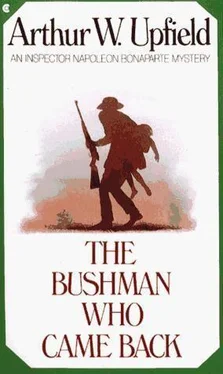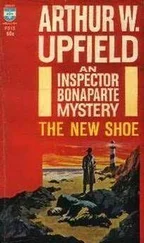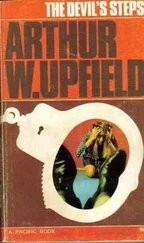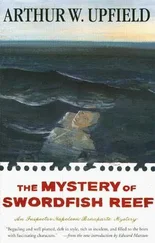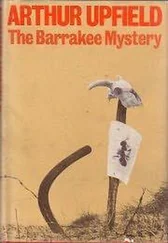Arthur Upfield - The bushman who came back
Здесь есть возможность читать онлайн «Arthur Upfield - The bushman who came back» весь текст электронной книги совершенно бесплатно (целиком полную версию без сокращений). В некоторых случаях можно слушать аудио, скачать через торрент в формате fb2 и присутствует краткое содержание. Жанр: Классический детектив, на английском языке. Описание произведения, (предисловие) а так же отзывы посетителей доступны на портале библиотеки ЛибКат.
- Название:The bushman who came back
- Автор:
- Жанр:
- Год:неизвестен
- ISBN:нет данных
- Рейтинг книги:4 / 5. Голосов: 1
-
Избранное:Добавить в избранное
- Отзывы:
-
Ваша оценка:
- 80
- 1
- 2
- 3
- 4
- 5
The bushman who came back: краткое содержание, описание и аннотация
Предлагаем к чтению аннотацию, описание, краткое содержание или предисловие (зависит от того, что написал сам автор книги «The bushman who came back»). Если вы не нашли необходимую информацию о книге — напишите в комментариях, мы постараемся отыскать её.
The bushman who came back — читать онлайн бесплатно полную книгу (весь текст) целиком
Ниже представлен текст книги, разбитый по страницам. Система сохранения места последней прочитанной страницы, позволяет с удобством читать онлайн бесплатно книгу «The bushman who came back», без необходимости каждый раз заново искать на чём Вы остановились. Поставьте закладку, и сможете в любой момент перейти на страницу, на которой закончили чтение.
Интервал:
Закладка:
Without effort, Arnold Bray took up the body and carried it to the woman’s bedroom, where he placed it on the bed and then found a spare sheet with which to cover it. Cover the Dead… She had been a good woman, above him in so many things, a woman he had admired humbly when there had been women he had admired, but not humbly. The possible motive for this thing, so much worse than mere murder you read of in the papers, persisted in entering his mind, although he fought it back with savage anger. And so preoccupied was he by the futility of it all that without conscious animation he drew the blind, and then passed from room to room to draw down every blind.
Bill Harte called from the rear door, and Arnold went to him, hope reborn, and slain again when he looked into Bill’s eyes.
“Come with me,” Harte said harshly. “You check.”
He led the way to the underground tank which had cemented floor and walls and a canegrass roof rising to a pyramidal summit. From this place he proceeded a dozen steps to the rear of the meat-house, where he halted and stared at the ground against the grass wall in the lee.
“Whatd’you see?” he demanded.
Arnold saw nothing at first, save the imprints of a dog. Then larger prints appeared to grow on the light-red ground, so that the dog’s prints faded into insignificance. What now he was seeing were three prints made by a man’s boots. They were unusual in that there were no heel marks.
“Youmusta seen those prints some time or other,” Bill stated.
“If I did I don’t recall them,” admitted Arnold. “Still, they look like the prints of a man running. No heel marks. I know! Ole Fren Yorky walks like he’s always running. They’re his tracks.”
“Yair. Yorky made ’em.”
“But Yorky’s in town on a bender.”
“Couldn’t be. Yorky made them tracks four-five hours ago. That right what Eric says about the telephone and the transceiver?”
Arnold nodded. He said with sudden determination:
“I’m driving the truck to meet the boss. He’ll have to go back to town to report to Pierce and bring men out to join in the hunt for Yorky. Yorky’s got Linda… if he hasn’t killed her. Yorky’s got to be nabbed, and quick. If he’s killed Linda you keep him away from me.”
Chapter Three
The Deceitful Land
WITHINMINUTESof a crime being reported in a city, a superbly organized Police Department, backed by modern scientific aids, goes into action. It was not to the discredit of Senior Constable Pierce that he was thwarted by inability to see without lights over an area of something like ten thousand square miles of semi-desolation; because the weather was against him in a land where the weather can aid or baffle keen eyes and keen brains.
He arrived with the doctor from Loaders Springs shortly after nine on that night following the murder of Mrs Bell. It was then black night, the stars blotted out by dust raised all day by the mighty wind. Before dawn a new transceiver was working at the Mount Eden homestead, and a new telephone installed. At dawn two trucks left to locate the aborigines and bring back all the males, to be put to tracking. Soon after dawn cars and trucks began to arrive, bringing neighbours from homesteads fifty, sixty, a hundred miles distant, and at dawn other men rode out from homesteads still farther distant to patrol possible lines of escape for the murderer of Mrs Bell, and the abductor of her daughter.
The man called Ole Fren Yorky, born in Yorkshire, brought to Australia when he was fifteen, outwitted bushmen reared in this vastness of land and sky, and the native trackers of whom the world has no equal. His tracks were discovered at the vacated camp of the aborigines situated less than a mile from the homestead, and beside the canegrass meat-house within yards of the house kitchen door; those two places sheltered by the wind. He carried a Winchester. 44 repeating rifle, and the woman had been shot by a bullet of this calibre.
Men discussed the motive, but more important was the finding of Linda Bell, alive or dead. Her fate was of paramount importance, for until the child’s body was found, hope remained in the hearts of the hunters.
The initial verve of the hunters gradually degenerated into doggedness. The aborigines lost interest, rebelled against the driving of the white men, as though convinced that Yorky, with the child, had won clear of their ancient tribal grounds.
The white force dwindled, men being recalled to their homestead to attend chores which could no longer be neglected, and at the end of four weeks the organized search was abandoned.
Three days after Constable Pierce informed Wootton of the official abandonment of the search, the station owner was told of the coming of another policeman. Wootton had engaged Sarah, from the aborigines’ camp, as cook, and Sarah’s daughter, Meena, as maid, and the routine of the station was as though interruption had never been when this morning, as usual, Meena brought to the living-room table the large tray bearing Mr Wootton’s breakfast. Cheerfully he said “Good morning”, and shyly demure as usual, Meena responded.
Meena was in her early twenties. She had lost the awkward angularity of youth, and was yet distant from ungainliness reached early by the aborigines. Not a full blood, her complexion was honey, and her features were strongly influenced by her father, even her eyes being flecked with grey. Wearing a colourful print dress protected by a snow-white apron, her straight dark hair bunched low on her neck, and with red shoes on her feet, she was an asset to any homestead, and, in fact, was appreciated by Mr Wootton. Her voice was without accent, soft and slow.
“Old Canute say for me to ask you for tobacco in advance. He’s been giving too much to Murtee, and Murtee says he used his to stop old Sam’s toothache.”
“Sam’s toothache, Meena!” exclaimed Mr Wootton. “Why, old Sam must have lost his last tooth fifty years ago.”
“Old Sam lost his last tooth before I was born. But old Canute’s run through his tobacco. He says if Mr Wootton won’t hand out, then tell Mr Wootton what about a trade.”
“A trade! Explain, Meena.”
“Canute says for you to give him a plug of tobacco, and he’ll tell you something you ought to know.”
“Oh,” murmured Mr Wootton. “Sounds like blackmail to me. D’you know what this something is I ought to know?”
“Yes, Mr Wootton. I know. Canute told me.”
“And you won’t tell unless I promise to give that wily scoundrel a plug of tobacco?”
The expression of severity on the cattleman’s face subdued Meena. For the first time she shuffled her feet on the bare linoleum. She spoke two words revealing the unalterable position she occupied.
“Canute boss.”
Wootton’s experience of aborigines was limited, but he did know the force and authority wielded by the head man of a native clan, and thus was aware that the girl was behaving naturally, was merely a go-between as the messenger between Canute and himself. Severity faded from his green eyes.
“All right, Meena. I’ll trade. Pour me a cup of coffee.”
The girl poured the coffee, then, standing away from the table, she said:
“Old Canute say to tell you big-feller policeman come soon.”
Again Mr Wootton did not scoff.
“How does Canute know that?” he asked quietly. “I was talking with Constable Pierce on the phone less than an hour ago, and he knew nothing about another policeman coming here. Canute’s only guessing, Meena. Not worth a plug of tobacco.”
“Him and Murtee sit-down beside little fire last night,” Meena said seriously. “Little fire. By themselves. The lubras not allowed to look.”
“But you did, eh?”
“I am not a lubra.”
Читать дальшеИнтервал:
Закладка:
Похожие книги на «The bushman who came back»
Представляем Вашему вниманию похожие книги на «The bushman who came back» списком для выбора. Мы отобрали схожую по названию и смыслу литературу в надежде предоставить читателям больше вариантов отыскать новые, интересные, ещё непрочитанные произведения.
Обсуждение, отзывы о книге «The bushman who came back» и просто собственные мнения читателей. Оставьте ваши комментарии, напишите, что Вы думаете о произведении, его смысле или главных героях. Укажите что конкретно понравилось, а что нет, и почему Вы так считаете.
